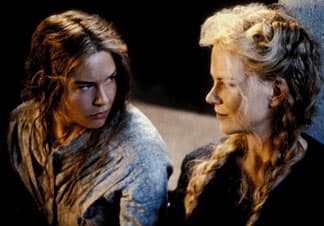Somewhere in the first hour of Anthony Minghella's intimate epic Cold Mountain, our heroine, Ada Monroe (Nicole Kidman), is lowered down a well and told that she can glimpse her future. A wealthy, educated Southern belle, she has drawn an unlikely match in her attraction to Inman (Jude Law), a soft-spoken labourer, but their brief courtship ends when the town's men are sent off to war. As defeat grows imminent for the South, a wounded, disillusioned Law flees his hospital bed and embarks on the long journey home. Years later, a blurry apparition appears in the rippling water, foretelling Ada that her love will soon return. Though a few stolen kisses are all that bind Jude Law and Nicole Kidman in Cold Mountain, they are reason enough to mount a sumptuous Civil War drama around them. Working from Charles Frazier's Odyssean novel, the film is less a war epic than an evocative romantic melodrama. Though Law and Kidman spend much of the movie apart, Minghella and ace editor Walter Murch arrange their interweaving subplots like a running dialogue between two lovers, each compelled to survive on the thin hope that they'll be reunited. Minghella has a firm grasp of the period and works well with his supporting characters, a raft of A-list Miramax hillbillies (Philip Seymour Hoffman, Natalie Portman, Giovanni Ribisi, Melora Walters, Jenna Malone) who deliver moments of unexpected poignancy. He also gets a ton from Renée Zellweger, whose showy Oscar-winning turn as Ruby, the straight-talkin' country bumpkin, upstages the more taciturn Kidman in almost every scene. Zellweger makes the most of her outsize bonnets and delivers a unique physical performance that, at times, verges on parody but manages to be generous enough of spirit to not verge on the overblown. Accompanying the first disc is a solid commentary by Minghella and editor Walter Murch, in which the director displays the intelligence and studiousness he brought to the film. His dissections of the film's images and sound design are meticulous and confirm his skills as a terrific filmmaker. The second disc begins with an exhaustive featurette, "Climbing Cold Mountain," that documents the making of the film from its earliest stages (building designs and models) to its finishing touches. Minghella and cinematographer John Searle make a character of the landscape with Romania posing as North Carolina. Its densely forested, spiritually-bankrupt atmosphere is the perfect backdrop for a world in which men kill each other for sport and women stick around to pick up the pieces. For fans of the film's music, you won't want to miss "Words and Music of Cold Mountain," which clocks in at an hour-and-a-half and features, among other things, musical performances from the film's soundtrack and a discussion with Minghella and film historian Davis Thompson. Rounding out the second disc's supplemental materials are 11 deleted scenes, three storyboard comparisons, a brief history of the sacred harp and sneek peeks. (Alliance Atlantis)
Cold Mountain
Anthony Minghella

BY Laura FrancisPublished Aug 1, 2004